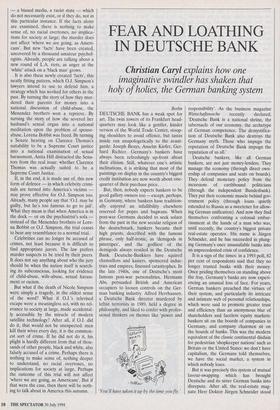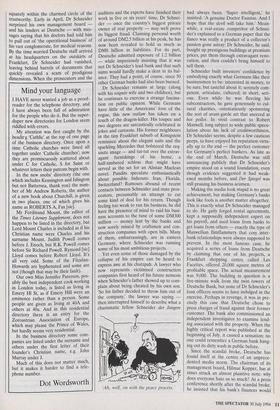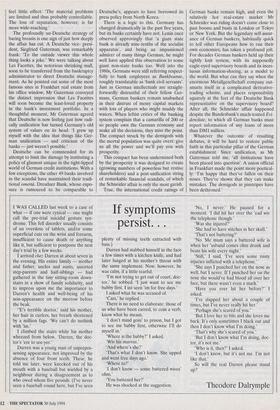FEAR AND LOATHING IN DEUTSCHE BANK
Christian Caryl explains how one
imaginative swindler has shaken that holy of holies, the German banking system
Berlin DEUTSCHE BANK has a weak spot for art. The twin towers of its Frankfurt head- quarters may look like a gentler, kinder version of the World Trade Center, stoop- ing shoulders to avoid offence, but tastes inside run unapologetically to the avant- garde: Joseph Beuys, Anselm Kiefer, Ger- hard Richter. Germany's bankers have always been refreshingly up-front about their elitism. Still, whatever one's artistic inclinations, it is striking that most of the paintings on display in the country's biggest credit institution are now worth about one- quarter of their purchase price.
But, then, nobody expects bankers to be good gallery owners too — except, perhaps, in Germany, where bankers have tradition- ally enjoyed an infallibility elsewhere reserved for popes and bagwans. When post-war Germans decided to seek solace from the past in the new secular religion of the deutschmark, bankers became their high priests, described with the famous phrase, only half-ironic, as 'demigods in pinstripes', and the godliest of the demigods always resided in the Deutsche Bank. Deutsche-Bankiers have squired chancellors and kaisers, sponsored indus- tries and empires, finessed catastrophes. In the late 1940s, one of Deutsche's most famous post-war personalities, Hermann Abs, persuaded British and American occupiers to loosen controls on the Ger- man banking industry. Alfred Herrhausen, a Deutsche Bank director murdered by leftist terrorists in 1989, held a degree in philosophy, and liked to confer with profes- sional thinkers on themes like 'power and
'You'll have taken it up by the time you fly.' responsibility'. As the business magazine Wirtschaftswoche recently declared, 'Deutsche Bank is a national shrine, the tabernacle of our economy, the archetype of German competence. The demystifica- tion of Deutsche Bank also destroys the Germany myth. Those who impugn the reputation of Deutsche Bank impugn the reputation of us all.'
Deutsche bankers, like all German bankers, are not just money-lenders. They manage the economy (through direct own- ership of companies and seats on boards). They defend monetary policy from the incursions of earthbound politicians (through the independent Bundesbank). They put their economic muscle behind gov- ernment policy (through loans quietly extended to Russia as a sweetener for allow- ing German unification). And now they find themselves confronting a colossal embar- rassment at the hands of a man who was, until recently, the country's biggest private real-estate operator. His name is Jiirgen Schneider, and he has succeeded in plung- ing Germany's once unassailable banks into an unprecedented crisis of confidence.
It is a sign of the times: in a 1993 poll, 82 per cent of respondents said that they no longer trusted banks with their money. Once priding themselves on standing above the fray, Germany's banks are now experi- encing an unusual loss of face. For years, German bankers preached the virtues of their system, and particularly its intricate and intimate web of personal relationships, which were said to promote greater trust and efficiency than an anonymous blur of shareholders and faceless equity markets: bankers sit on the boards of companies in Germany, and company chairmen sit on the boards of banks. This was the modern equivalent of the classic continental disdain for pedestrian 'shopkeeper nations' such as Britain or the United States: we don't have capitalism, the Germans told themselves, we have the social market, a system in which nobody loses.
But it was precisely this system of mutual favour-swapping which has brought Deutsche and its sister German banks into disrepute. After all, the real-estate mag- nate Herr Doktor Thrgen Schneider stood squarely within the charmed circle of the trustworthy. Early in April, Dr Schneider surprised his own management board and his lenders at Deutsche — with mes- sages saying that his doctors had told him to pull out of 'the operational business' of his vast conglomerate, for medical reasons. By the time worried Deutsche staff arrived at his headquarters on the outskirts of Frankfurt, Dr Schneider had vanished, leaving behind barrels of documents that quickly revealed a scam of prodigious dimensions. When the prosecutors and the auditors and the experts have finished their work in five or six years' time, Dr Schnei- der — once the country's biggest private owner of real property — may well prove its biggest fraud. Claiming personal worth of around DM2.5 billion at his peak, he has now been revealed to hold as much as DM8 billion in liabilities. For its part, Deutsche admitted exposure of 1.2 billion — while imperiously insisting that it was not Dr Schneider's lead bank and that such sums would hardly make a dent in its bal- ance. They had a point, of course, since 50 other German banks had also been burned.
Dr Schneider remains at large (along with his soignee wife and two children), but he continues to exercise a strange fascina- tion on public opinion. While Germans have little of the Americans' love of the rogue, this new outlaw has taken on a touch of the dragon-killer. His toupee and two degrees are sarcastically celebrated in jokes and cartoons. His former neighbours in the tiny Frankfurt suburb of Konigstein reminisce about the elegant suits and the sparkling Mercedes that bolstered the req- uisite image — and tut-tut over the extrav- agant furnishings of his home, a half-timbered schloss that might have served as the set for an Alistair Maclean novel. Pundits speculate enthusiastically about possible hideouts: Iran, Florida, Switzerland? Rumours abound of recent contacts between Schneider and state pros- ecutors, presumably an attempt to cut some kind of deal for his return. Though feeling too weak to run his business, he did have the presence of mind to raid his busi- ness accounts to the tune of some DM300 million — money lent by the banks and now sorely missed by craftsmen and con- struction companies with open bills. Many of them, embarrassingly, are in eastern Germany, where Schneider was running some of his most ambitious projects.
Yet even some of those damaged by the collapse of his empire can be heard to express awe at his chutzpah. A lawyer who now represents victimised construction companies first heard of his future nemesis when Schneider's father showed up to com- plain about being cheated by his own son. `So his father decided to throw him out of the company,' the lawyer was saying then interrupted himself to describe what a charismatic fellow Schneider der Angere 'Ah, well, on with the peace process." had always been. 'Super intelligent,' he insisted. 'A genuine Doctor Faustus. And I hope that the devil will take him.' Mean- while, a real-estate competitor of Schnei- der's explained to a German paper that the fiasco was really a product of a collector's passion gone astray: Dr Schneider, he said, bought up prestigious buildings at premium prices, put them through extravagant reno- vation, and then couldn't bring himself to sell them.
Schneider built investors' confidence by embodying exactly what Germans like their businessmen to be: interested in money, to be sure, but tasteful about it; serenely com- petent, articulate, cultured; in short, seri- ous. Even while he was fleecing his subcontractors, he gave generously to cul- tural charities, ostentatiously sponsoring the sort of avant-garde art that sneered at hoi polloi. In vivid contrast to Robert Maxwell, long subject to wide public specu- lation about his lack of creditworthiness, Dr Schneider seems, despite a few cautious peeps, to have enjoyed his reputation virtu- ally up to the end — the perfect customer for Germany's perfect bankers. As late as the end of March, Deutsche was still announcing publicly that Dr Schneider's empire stood on a sound foundation, even though evidence suggested it had weak- ened months before, and Der Spiegel was still praising his business acumen.
Making the media look stupid is no great achievement; but making Germany's banks look like fools is another matter altogether. This is exactly what Dr Schneider managed to do. He gaily forged rental agreements, kept a supposedly independent expert on his payroll, and used loans from banks to get loans from others — exactly the type of Maxwellian flimflammery that cosy inter- bank relationships were always supposed to prevent. In the most famous case, he acquired a series of loans from Deutsche by claiming that one of his projects, a Frankfurt shopping centre called Les Facettes, offered 20,000 square metres of profitable space. The actual measurement was 9,000. The building in question is a five-minute walk from the twin towers of Deutsche Bank, but none of Dr Schneider's loan officers seems to have indulged in the exercise. Perhaps in revenge, it was in pre- cisely this case that Deutsche chose to press charges of fraud against their former customer. The bank also commissioned an independent investigator to examine lend- ing associated with the property. When the highly critical report was published at the beginning of July, it caused a sensation: no one could remember a German bank hang- ing out its dirty wash in public before. Since the scandal broke, Deutsche has found itself at the centre of an unprece- dented media storm. The chairman of its management board, Hilmar Kopper, has at times struck an almost plaintive note: why does everyone hate us so much? At a press conference shortly after the scandal broke, he insisted that his bank's finances would feel little effect: 'The material problems are limited and thus probably controllable. The loss of reputation, however, is far more wide-reaching.'
The profoundly un-Deutsche strategy of baring breasts is one sign of just how deeply the affair has cut. A Deutsche vice- presi- dent, Siegfried Guterman, was remarkably frank: 'To the outside viewer this whole thing looks a joke.' We were talking about Les Facettes, the notorious shrinking mall, soon to be transferred from the bankruptcy administrator to direct Deutsche manage- ment. As he pointed out some of the most famous sites in Frankfurt real estate from his office window, Mr Guterman conveyed the distinct impression that Les Facettes will soon become the least-loved property in the bank's investment portfolio. In a thoughtful moment, Mr Guterman agreed that Deutsche is now feeling just how radi- cally unification has turned Germany's old system of values on its head. 'I grew up myself with the idea that things like Ger- man unification — and criticism of the banks — just weren't possible.'
Deutsche can be commended for its attempt to limit the damage by instituting a policy of glasnost unique in the tight-lipped world of German credit institutions. With a few exceptions, the other 49 banks involved in the scandal have maintained their tradi- tional omerta. Dresdner Bank, whose expo- sure is rumoured to be comparable to
Deutsche's, appears to have borrowed its press policy from North Korea.
There is a logic to this. Germany has changed dramatically in the past five years, but its banks certainly have not. Lenin once observed approvingly that 'a giant state bank is already nine-tenths of the socialist apparatus', and being an impassioned admirer of many things German, he might well have applied this observation to some giant non-state banks too. Well into the 1980s, Germans were still referring respect- fully to bank employees as Bankbeamte, roughly translatable as 'bank civil servants'. Just as German intellectuals are straight- forwardly distrustful of their fellow Ger- mans, German bankers remain unabashed in their distrust of messy capital markets with lots of players who might muddy the waters. When leftist critics of the banking system complain that a camarilla of 200 or so people own the German economy and make all the decisions, they miss the point. The compact struck by the demigods with the mortal population was quite overt: give us all the power and we'll pay you with prosperity.
This compact has been undermined both by the prosperity it was designed to create (growing numbers of powerless but restive shareholders) and a post-unification string of remarkable financial scandals, of which the Schneider affair is only the most garish.
True, the international credit ratings of
German banks remain high, and even the relatively hot real-estate market Mr Schneider was riding doesn't come close to past booms and busts in London or Tokyo or New York. But the legendary self-assur- ance of German bankers, habitually quick to tell other Europeans how to run their own economies, has taken a profound jolt. For decades German bankers held up their tightly knit system, with its supposedly eagle-eyed supervisory boards and its inces- tuous information-sharing, as a model to the world. But what can they say when the enormous Metallgesellschaft company out- smarts itself in a complicated derivative- trading scheme, and places responsibility squarely at the feet of the Deutsche Bank representative on the supervisory board? After all, the Schneider affair happened despite the Bundesbank's much-touted Evi- denzliste, to which all German banks must report information of any loans of more than DM1 million.
Whatever the outcome of resulting debates, it will be hard to restore public faith in this particular pillar of the German establishment. Since unification, as Mr Guterman told me, 'all institutions have been placed into question'. A union official in Frankfurt made the point more poetical- ly: `I'm happy that they've fallen on their noses. They've shown that they can make mistakes. The demigods in pinstripes have been dethroned.'




















































 Previous page
Previous page